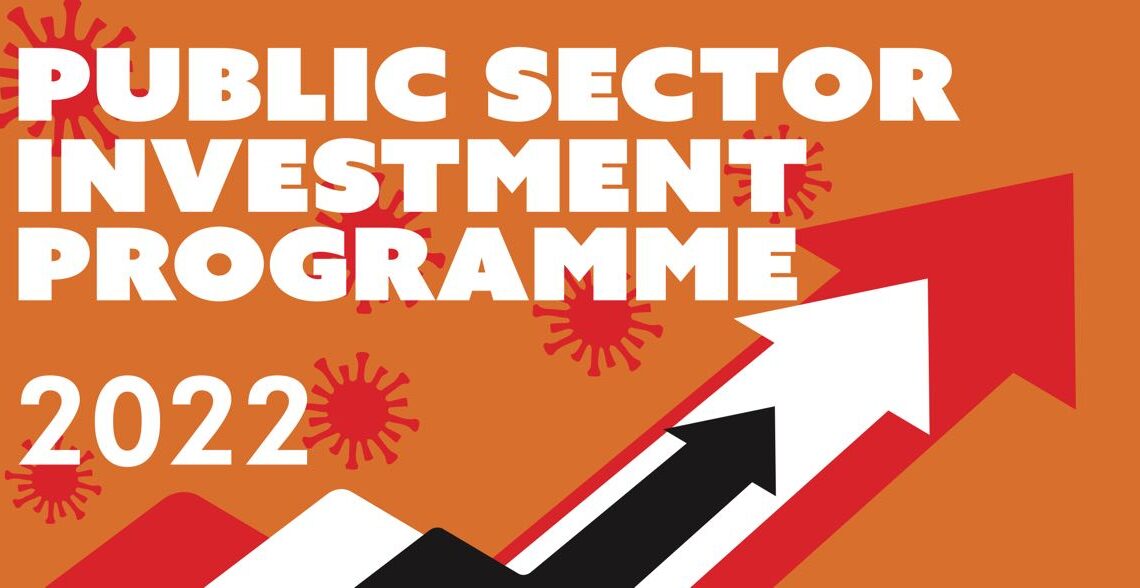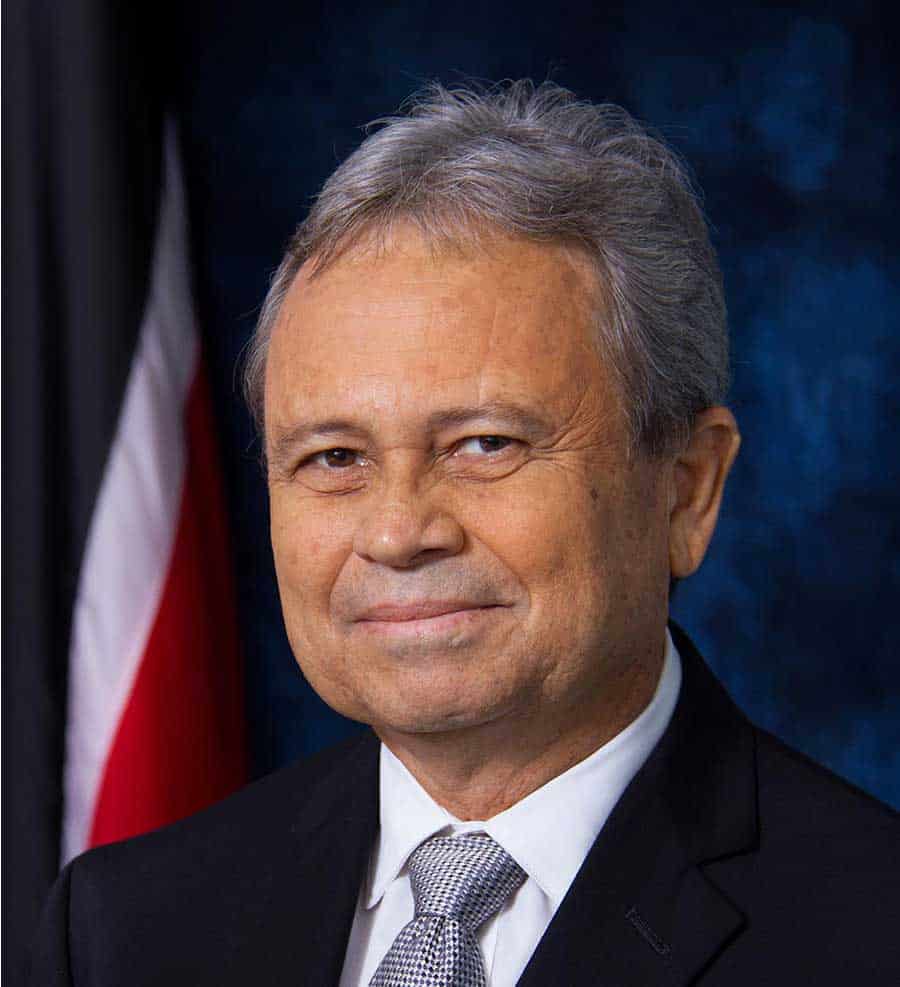
- Digital transformation is namedropped throughout the 2021-2022 budget documents
- Few projects are clearly articulated and even less have identified timelines for starting or ending
Above: A portion of the cover for the PSIP for 2022.
BitDepth#1323 for October 11, 2021
Finance Minister Colm Imbert had a choice. He could deliver a budget that boldly declared a visionary, if potentially risky path forward for ICT, or he could refry the beans again.
It’s time to reach for your tortilla shells, because that was last week’s budget menu.
The government did make one small but significant change in the new budget, completely reversing the January 2016 decision to tax computers, software and peripherals, though books remain on the tax list.
There is a case to be made for conservative planning particulary when restrictive conditions under a pandemic have caused economic slowdowns nationwide.
But after the government convened a panel of volunteers to design a Roadmap to Recovery, appointed a Digital Transformation Advisory Committee on February 24, 2021, and created an entire new ministry to fast-track digital transformation, the public was entitled to expect more aggressive and focused attention on ICT from the 2021-2022 budget.
Instead, the budget speech and its supporting documents are peppered with token references to digital transformation, with few references to specific strategy and tactics. It’s as if the government decided that digital transformation was like The Candyman, say the words often enough and it would appear.
In his budget speech, the Finance Minister said, “Our businesses must digitize; they must have online presences that is, they must have a digital footprint, online marketplace and digitally-enabled value chains.”
There is no business operating in TT today that doesn’t understand that challenge at some level, but the facilitation of electronic payments and digital value transfer proceeds with alarming lethargy.
The E-Money Issuer Order became law in August 2020 and in September, the banking sector was “guided” to relax and simplify know-your-customer rules.
Neither has delivered any significant impact on the economic landscape.
The annually touted, never-executed digital transformation of the Police Service, remains a wishlist item.
Fulsome paragraphs are offered up about the introduction of digital tracking bracelets with a supporting electronic monitoring system and the spending of almost $10 million on body cameras, dash-cams, GPS tracking devices and laptops.
Yet there is not one word about the development of systems that link all these data capture sources or the training necessary for officers to use them effectively. That’s probably waiting on the “Expansion of Police Network” item to be completed.
That’s a project well into its third year that’s supposed to create a modern digital network that connect police infrastructure and, presumably, working officers into an effective data network driven by more efficient information exchange.
This would be a major advance in an environment that still relies to an unholy degree on huge handwritten ledgers that turn trained police officers into scribes and bookkeepers.
In other notable quotes, the Finance Minister noted truthfully, “We might be perceived as being behind in the Digital ID race.” But there is no articulated plan for a digital ID system.
He also observed that, “The e-state apparatus is demonstrating value for money,” which is a curious way of describing downloadable PDFs of forms and off-the-shelf appointment booking systems.
It’s as if the government decided that digital transformation was like The Candyman, say the words often enough and it would appear.
The contribution of ICT to GDP is supposed to double from four per cent to eight per cent over an unstated time, but it unclear how this will happen.
Meanwhile, the core of any serious digital transformation initiative, a data-driven understanding of the country’s economy and infrastructure, remains in a state of collapse.
This unusually frank statement of the situation appears in the Social Sector Investment Programme supporting document.
“Challenges of data collection and assessment, and the persistent shortage of statistical personnel and monitoring and evaluation specialists in the public sector, continue as areas for urgent attention.”
“Capacity gaps have been identified in the national statistical system that prohibit the collection and timely dissemination of data; even disaggregation remains a challenge.”
“When combined with the difficulties caused by sub-optimal collaboration and information-sharing within Government, and with the private sector and civil society, it becomes starkly evident that Trinidad and Tobago must continue working to remove such hindrances to the advancement of the 2030 Agenda.”
If all that seems like a particularly depressing mouthful, here’s a summary.
We aren’t collecting enough information, not even within government agencies we control, and we can’t share the information we do have with the public, because it is still linked to personal, identifiable information.
In the face of this acknowledged collapse in data collection and management, how can the government have a clear idea of where it is now?
Allocating a million dollars to a Smart Agriculture Artificial Intelligence project is worse than useless without a history of accurate data to fuel that effort.
It is, to anyone who is familiar with the scale of the datasets that inform AI and the sorry state of TT’s agricultural records, a pappyshow that borders on insult.
Without an understanding where you are now, it’s pointless charting a path, because any direction, no matter how meandering, will get you…somewhere.
The Digital Transformation Ministry will work with $300 million over the next year, $77 million of which will be used to start programmes for a Digital Society, Digital Economy and Digital Government.
The sum of $236 million will be spent on the “improvement of the information technology infrastructure of the public service.”
Deep in the Public Sector Investment Programme document, you’ll find that for Tobago, $3.8 million is budgeted for a Computerisation Programme and another $10 million for an ICT Support Programme.
What became of the money budgeted for e-government and FinTech over the last three years? Are we starting everything over because there’s now a digital transformation ministry?
The government now requires ministries to deliver a three-year budget for projects. The national digital identity project is budgeted at $60 million in 2022 and $17 million in 2023, when it is expected to be concluded.
This is a rare instance of even a broad-brush timeline being applied to a specific ICT project.
Offering small businesses an online marketplace ignores the shameful waste that was EnterpriseNETT, the first and last effort at an state-sponsored online shopping mall that supported not even a single online store during its entire existence.
It’s time that the government accepted that it isn’t very good at private enterprise and even worse at digital private enterprise.
WiPay will give you an ecommerce store and a payment option for a structured fee, so why is the government, which struggles mightily with its online TravelPass, trying to build a wheel it has proven incapable of putting on the road successfully?
The Finance Minister noted in the budget that “online education is here to stay.” That isn’t immediately clear at this point.
The Ministry of Education has ambitious plans for twelve areas of digitalisation after demonstrating over the course of nineteen months that is incapable of doing any of them properly.
The Government’s list of Education Ministry digital projects.
- School Learning Management System (SLMS)
- E-books
- Literacy and Numeracy Adaptive Learning system
- Education Management Information System
- Open Educational Resources (OERs)
- National Online Open School
- Student Digital Literacy
- Human Resource Support
- School Infrastructure Upgrades (School Issue Management System – SIMS)
- Teacher Training
- Curriculum Enactment
- E-testing
How is any of this going to get done when we couldn’t manage it while students and teachers were in desperate need and it was high on the agenda?
The nation is now in its fourth consecutive term of remote teaching and abandoning the value of that experience would be criminal.
But there’s nothing in the budget about the Education Ministry’s plan for a post-pandemic evaluation of that’s been learned about remote education since March 2020.
In much the same way that dropping hundreds of thousands of computers (albeit somewhat haphazardly) into the school system between 2010 and 2015 changed the experiences of those students, remote teaching has shaken the education system and we must consider carefully the value of what’s fallen from this metaphorical tree.
A budget that pretends everything worked out well in ICT in 2019 and 2020 is, ultimately, a farce of verbose promises.
Digital transformation thrives in an environment of hard numbers; and this failure to be specific about any ICT initiative for 2021-2022 is incomprehensible in a country that has had a ministry dedicated to digital transformation for more than a year.


